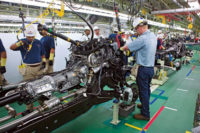TOKYO—Shoichiro Toyoda, the former president of Toyota, died on Feb. 14 at 97 due to heart failure.
After taking over as Toyota's president in 1982, Toyoda helped the company transition into a major international automaker, particularly in the U.S. market, where its name came to stand for quality, durability, cost performance, and engineering finesse.
From 1981 to 1992, he served as Toyota's president, overseeing the company's entry into North American manufacturing and the launch of the Lexus luxury brand. The company chose to join the American car industry, demonstrating that Toyota was an asset to the country's citizens by generating employment and value.
The manufacturer's sales in the United States increased by 49% from 711,993 when he took office in 1981 to 1.1 million vehicles in 1990 before falling back to 1 million when he left office in the recession year of 1992. Toyota's rapid international expansion in the 1980s was supported by the booming U.S. market. From 3.34 million vehicles sold worldwide in 1981 to 4.64 million in 1992, a 39% increase.
The first Toyota assembly factories in North America contributed to the U.S. boom. Toyota's facility in Georgetown, Kentucky, is still the largest plant in North America, producing 504,213 vehicles in 2013. Shoichiro Toyoda was acknowledged for his contributions to Toyota by being inducted into the U.S. Automotive Hall of Fame in 2007.


